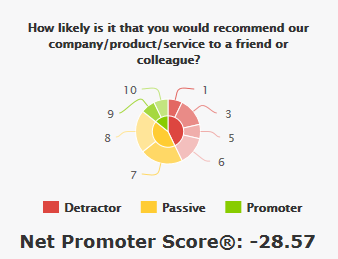The Net Promoter Score
NPS* is an optimized customer loyalty metric developed by business strategist Fred Reichheld in 2003 at Harvard. It was soon put into practice by Bain & Company and Satmetrix as a way to increase significance and return rates of customer surveys.
The Net Promoter Score measures the loyalty that exists between a company or employer and their customers or employees. It's basis is the question "How likely is it that you would recommend our company/product/service to a friend or colleague?". This question puts the customer's personal integrity towards the people he or she trusts most on the line. Expressing a high likelihood of recommendation proves loyalty to the brand or product, while other surveys only measured satisfaction with a specific product or service.
The scoring for the answer is based on a 0 to 10 scale split into the following groups:
- Promoters (9-10): Loyal enthusiasts
- Passives (7-8): Undecided
- Detractors (0-6): Critics

The final score is calculated from the difference between the number of promoters in percent and the number of detractors in percent. On first sight the scale might seem unbalanced, but a person voting 6 obviously does have enough doubts to not count as loyal. Due to the scale being weighted towards exploring critics, a final score above 0 can be considered as good, a score higher than 50 would be excellent.
* Net Promoter, Net Promoter Score, and NPS are trademarks of Satmetrix Systems, Inc., Bain & Company, Inc., and Fred Reichheld.